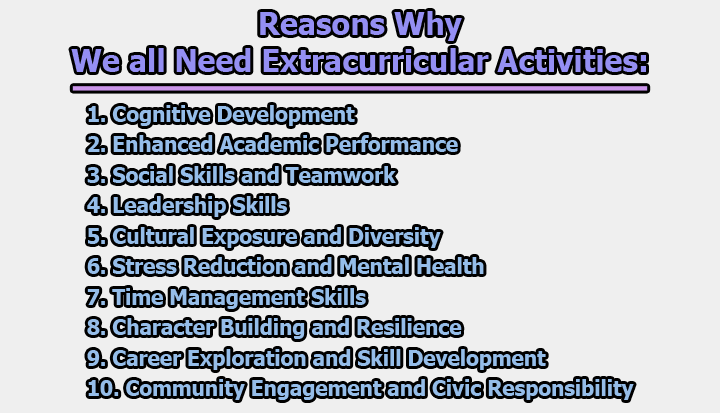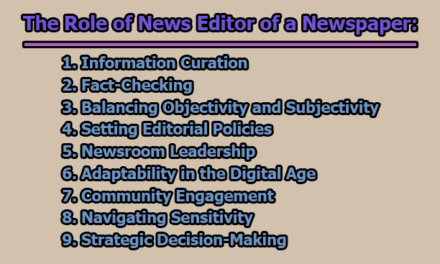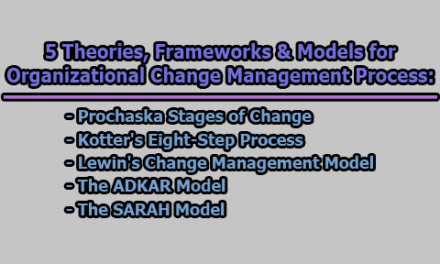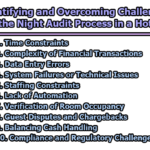Reasons Why We all Need Extracurricular Activities:
In the pursuit of academic excellence, it is easy to overlook the significance of extracurricular activities in shaping well-rounded individuals. The conventional emphasis on academic achievements often sidelines the importance of holistic development, encompassing physical, social, emotional, and cognitive aspects of an individual’s personality. Extracurricular activities play a pivotal role in bridging this gap, offering a diverse range of experiences that contribute to a multifaceted development. In this article, we will delve into the reasons why we all need extracurricular activities.
- Cognitive Development: Extracurricular activities contribute significantly to cognitive development by providing opportunities for individuals to engage in activities that stimulate their mental faculties. Activities such as debate clubs, science Olympiads, and chess tournaments require participants to think critically, solve problems, and exercise creativity.
Participating in a debate club, for instance, demands analytical thinking as individuals formulate arguments, anticipate counterpoints, and construct logical responses. This process not only hones cognitive skills but also cultivates effective communication, a skill applicable in academic, professional, and personal contexts.
In science Olympiads, students are challenged to apply theoretical knowledge to real-world problems, encouraging practical problem-solving skills. Similarly, chess tournaments demand strategic thinking, pattern recognition, and the ability to plan several moves ahead, fostering cognitive skills that extend beyond the chessboard into various aspects of life.
Engaging in such activities provides a dynamic and interactive learning environment that complements traditional classroom education. The cognitive skills developed through extracurricular activities are transferable and empower individuals to approach challenges with a well-rounded intellectual toolkit.
- Enhanced Academic Performance: Contrary to the belief that extracurricular activities may divert attention from academics, research consistently demonstrates a positive correlation between participation in such activities and improved academic performance. The time management, focus, and discipline required for extracurricular engagement often translate into better academic outcomes.
Students involved in activities such as sports, music, or clubs learn to balance their time effectively, allocating slots for both study and extracurricular pursuits. This enhanced time management not only aids in meeting academic deadlines but also instills a sense of responsibility and accountability.
Moreover, the holistic nature of extracurricular activities contributes to a more comprehensive skill set. For instance, a student participating in a robotics club not only gains technical skills but also develops problem-solving abilities, teamwork, and project management skills. These attributes can significantly enhance academic performance by providing a broader perspective and a more versatile skill set.
Consequently, extracurricular activities and academic success are not mutually exclusive; rather, they can complement and reinforce each other, creating a well-rounded and academically proficient individual.
- Social Skills and Teamwork: Extracurricular activities serve as invaluable platforms for the development of social skills and teamwork, aspects often overlooked in traditional academic settings. Participation in team sports, drama clubs, or community service projects exposes individuals to diverse social interactions, fostering crucial interpersonal skills.
Team sports, for example, require collaboration, communication, and collective effort. Athletes learn to trust and rely on their teammates, understanding the importance of coordination and shared goals. Similarly, drama clubs or music bands necessitate effective teamwork for a successful performance, teaching individuals to appreciate the contributions of each team member.
These experiences transcend the immediate context of the activity, imparting skills that are integral in personal and professional relationships. The ability to communicate effectively, empathize with others, and navigate social dynamics is crucial in various aspects of life, making extracurricular activities instrumental in shaping socially adept individuals.
- Leadership Skills: Extracurricular activities offer numerous opportunities for individuals to take on leadership roles, fostering the development of crucial leadership skills. Whether leading a sports team, organizing an event, or heading a club, these experiences provide practical insights into effective leadership.
Leadership in extracurricular settings goes beyond theoretical knowledge, requiring individuals to make real-time decisions, motivate team members, and navigate challenges. For instance, a student leading a debate team must not only possess a deep understanding of the subject matter but also inspire and guide team members towards a common goal.
These leadership experiences contribute to the cultivation of confidence, decision-making abilities, and a sense of responsibility. The leadership skills gained in extracurricular activities are transferable, preparing individuals for future roles in professional settings and societal leadership.
- Cultural Exposure and Diversity: Participation in cultural and arts-related extracurricular activities exposes individuals to diverse perspectives, fostering a more comprehensive understanding of the world. Whether it’s joining a multicultural dance group, participating in a language club, or engaging in art exhibitions, these activities broaden horizons and nurture an appreciation for diversity.
In a multicultural dance group, for example, individuals not only learn different dance styles but also gain insights into the cultural backgrounds of their peers. This exposure promotes tolerance, breaks down stereotypes, and encourages the celebration of differences.
Similarly, language clubs provide a platform for individuals to explore and appreciate various languages and cultures. This exposure contributes to the development of a global mindset, preparing individuals to navigate an increasingly interconnected world.
Extracurricular activities, in this context, act as windows to the world, fostering a richer understanding of cultural diversity and promoting open-mindedness in individuals. This cultural exposure is an essential aspect of education that goes beyond textbooks and traditional classroom learning.
- Stress Reduction and Mental Health: The demanding nature of academic life often takes a toll on students’ mental health, leading to stress and burnout. Extracurricular activities provide a crucial outlet for stress reduction and contribute significantly to overall mental well-being.
Engaging in activities one is passionate about, whether it be sports, art, or music, allows individuals to disconnect from academic pressures, providing a mental break. Physical activities, in particular, have been proven to release endorphins, the body’s natural stress relievers, promoting a sense of well-being.
Moreover, the camaraderie built in extracurricular settings creates a support system. Whether it’s teammates, fellow performers, or club members, these connections offer emotional support and a sense of belonging, reducing feelings of isolation and stress.
By incorporating extracurricular activities into their routine, individuals develop healthier coping mechanisms, resilience, and a more balanced approach to life’s challenges. This holistic focus on mental health is an essential aspect of education that goes beyond the academic realm.
- Time Management Skills: One of the most practical benefits of participating in extracurricular activities is the development of robust time management skills. Juggling academic commitments with extracurricular pursuits requires individuals to prioritize tasks, set realistic goals, and manage their time efficiently.
For instance, a student involved in a robotics competition needs to allocate time for team meetings, research, building, and practice sessions. This multifaceted schedule compels individuals to be proactive in planning, ensuring that neither academic responsibilities nor extracurricular commitments are neglected.
The skills acquired through effective time management are invaluable in academic settings and extend into professional and personal life. Individuals who master time management are better equipped to handle the complexities of modern life, contributing to their success both in and beyond the classroom.
- Character Building and Resilience: Extracurricular activities provide a fertile ground for character building and the cultivation of resilience. Facing challenges and setbacks in these pursuits helps individuals develop a robust character and learn to navigate adversity.
Whether it’s a defeat in a sports competition, a subpar performance in a music recital, or challenges in a community service project, individuals learn to persevere, adapt, and grow from their experiences. These lessons in resilience are invaluable, preparing individuals for the inevitable ups and downs of life.
Moreover, overcoming obstacles in extracurricular activities instills a sense of accomplishment and self-efficacy. This sense of agency contributes to the development of a positive self-image and the confidence to tackle challenges, both academic and personal, with determination.
- Career Exploration and Skill Development: Extracurricular activities serve as a testing ground for individuals to explore their interests and passions, often providing insights into potential career paths. Engaging in coding clubs, entrepreneurship programs, or environmental initiatives allows individuals to discover and hone skills that may shape their future careers.
For example, a student participating in a coding club may realize a passion for programming, leading to the pursuit of a career in computer science. Similarly, involvement in an environmental initiative may spark an interest in sustainability, potentially guiding an individual towards a career in environmental science or advocacy.
These activities go beyond theoretical knowledge, providing practical, hands-on experiences that are instrumental in skill development. Whether it’s leadership, problem-solving, or technical skills, extracurricular activities offer a dynamic environment for individuals to acquire and refine the skills relevant to their career aspirations.
- Community Engagement and Civic Responsibility: Participating in community service, volunteering, or activism through extracurricular avenues instills a sense of civic responsibility. This involvement goes beyond personal development, fostering a commitment to social causes and a realization of the impact individuals can have on their communities.
Whether it’s organizing a charity event, participating in a community cleanup, or advocating for social justice, these activities promote a sense of duty towards the well-being of society. Individuals learn to empathize with others, understand the challenges faced by different communities, and actively contribute to positive change.
The development of a strong sense of civic responsibility through extracurricular activities creates socially conscious individuals who are not only academically proficient but also actively engaged in making a positive impact on the world around them. This commitment to community and societal well-being is a testament to the transformative power of extracurricular engagement.
In conclusion, extracurricular activities are not mere optional additions to an academic curriculum; rather, they are indispensable components that contribute to the holistic development of individuals. Beyond the acquisition of knowledge within the classroom, these activities provide a fertile ground for the cultivation of crucial life skills, character traits, and a broader understanding of the world. As educators, parents, and individuals, we must recognize and emphasize the multifaceted benefits that extracurricular activities bring to the table. By integrating and promoting these activities, we pave the way for a generation that is not only academically proficient but also equipped with the diverse skills and perspectives needed to thrive in an ever-evolving world.

Former Student at Rajshahi University










